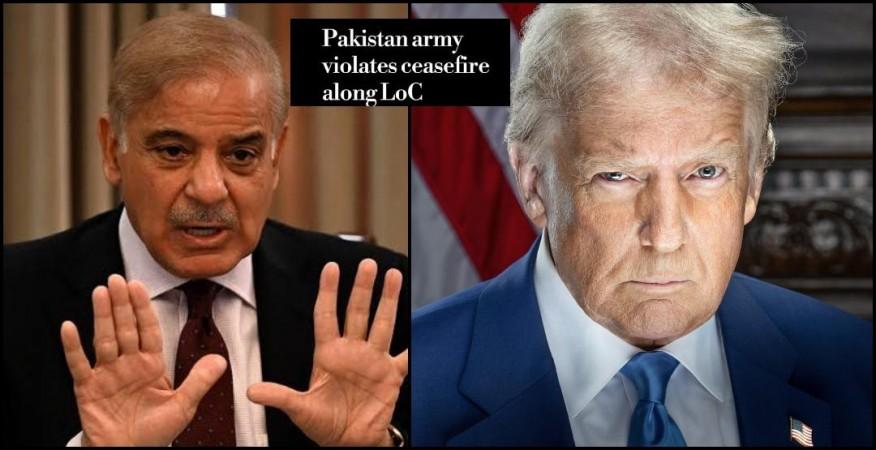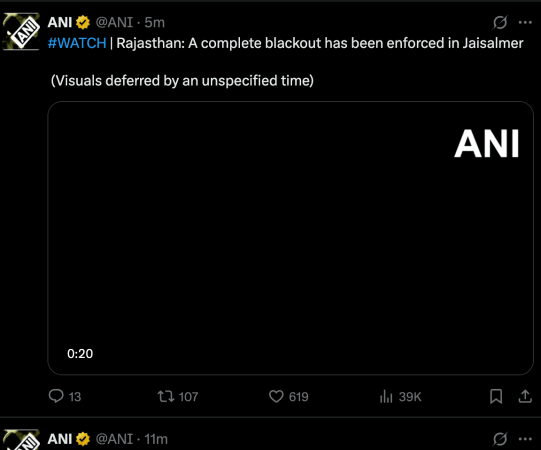
Just a few hours ago, U.S. President Donald Trump announced that both India and Pakistan had agreed to a full and immediate ceasefire.
Later that evening, India held a press conference confirming that it would abide by the agreement. The de-escalation was also confirmed by Pakistani Foreign Minister Ishaq Dar, U.S. Secretary of State Marco Rubio, and India's External Affairs Minister S. Jaishankar.
However, by around 9:00 PM, Pakistan reportedly violated the peace deal with artillery shelling and air raids in multiple border districts. The Pakistan Army opened fire along the International Border in the Akhnoor, Rajouri, and RS Pura sectors. Ceasefire violations were also reported along the Line of Control (LoC) in the Palanwalla sector of Jammu.
On Saturday, Pakistan breached the ceasefire agreement at multiple locations along both the International Border and the LoC.
Multiple explosions were heard in Srinagar and Baramulla, where a drone was shot down and several suspicious Unmanned Aerial Vehicles (UAVs) were sighted. Drones were also reported in Rajouri, and air raid sirens were activated in the Samba district of Jammu.
Reacting to the situation, Jammu and Kashmir Chief Minister Omar Abdullah tweeted, "What the hell just happened to the ceasefire? Explosions heard across Srinagar!!!"
Sharing a video, ANI posted on X (formerly Twitter), "Loud explosions are being heard in Srinagar, Jammu and Kashmir."
For security reasons, a complete blackout has been enforced in Ferozepur as well.
Take a look:


On Saturday, May 10, the two countries had earlier reached an understanding to halt all military action by land, air, and sea. However, India has clarified that the Indus Waters Treaty will remain suspended and that a ban on visas for Pakistani nationals will continue.

Day 3 of the India-Pakistan Conflict
The ongoing conflict between India and Pakistan has entered its third day, marked by escalating hostilities and mounting civilian impact. On the nights of May 7–8 and May 8, Pakistan launched coordinated missile and drone strikes targeting five military installations in Rajasthan. All incoming threats were successfully neutralised mid-air by India's advanced defence systems.
#WATCH | Loud explosions are being heard in Srinagar, Jammu and Kashmir.
— ANI (@ANI) May 10, 2025
(Visuals deferred by unspecified time) pic.twitter.com/8KwqqN2CFT
In response to the intensified attacks, India has deployed a robust array of air defence technologies across 15 major cities. These include the Barak-8, S-400 Triumph, Akash surface-to-air missiles, and indigenous anti-drone systems, reinforcing nationwide air security.
On May 9, a Pakistani drone hit a residential area in Punjab, injuring a family. The drone was eventually neutralised by Indian defence forces. That same day, Pakistani shelling in Rajouri led to the tragic death of Raj Kumar Thapa, the Additional District Development Commissioner of the region. Jammu and Kashmir Chief Minister Omar Abdullah later visited both the affected areas and Thapa's residence to offer condolences and assess the situation on the ground.
Earlier this week, India's launch of "Operation Sindoor", a targeted military response to the April 22 terror attack in Pahalgam, which claimed the lives of 27 civilians. As part of Operation Sindoor, India carried out precision missile strikes on nine identified terror camps located in Pakistan and Pakistan-occupied Kashmir (PoK).











